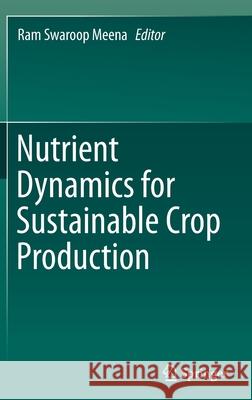Nutrient Dynamics for Sustainable Crop Production » książka



Nutrient Dynamics for Sustainable Crop Production
ISBN-13: 9789811386596 / Angielski / Twarda / 2019 / 350 str.
Nutrient Dynamics for Sustainable Crop Production
ISBN-13: 9789811386596 / Angielski / Twarda / 2019 / 350 str.
(netto: 575,06 VAT: 5%)
Najniższa cena z 30 dni: 578,30
ok. 22 dni roboczych.
Darmowa dostawa!
1. Soil Carbon Sequestration in Crop Production.- 2. Soil Quality for Sustainable Agriculture.- 3. Integrated Nutrient Management for Sustainable Crop Production and Improving Soil Health.- 4. Management of Micronutrients in Soil for the Nutritional Security .- 5. Nitrogen Footprint: A Useful Indicator of Agricultural Sustainability.- 6. Strategies for Identification of Genes towards Enhancing Nitrogen Utilization Efficiency in Cereals.- 7. Improving the Nitrogen Cycling in Livestock Systems through Silvopastoral Systems.- 8. Enhanced Phosphorus Fertilizer Use Efficiency with Microorganisms.- 9. Use of organic and biological fertilizers as strategies to improve crop biomass and yields and physicochemical parameters of soil.- 10. Organic Fertilizers for Sustainable Soil and Environmental Management.- 11. Role of Nanotechnology for Enhanced Rice Production.
Ram Swaroop Meena was born in a farmer family in VOP, Harsana, Tehsil, Laxmangarh, Alwar District, Rajasthan, India. Dr. Meena had his schooling in the same village and graduated in Agriculture in 2003 from the Sri Karan Narendra Agriculture University, Jobner, Jaipur (Rajasthan). Dr. Meena has obtained his Master’s and Doctorate in Agronomy from the Swami Keshwanand Rajasthan Agricultural University, Bikaner (Rajasthan), securing first division in all the classes with triple NET, Junior Research Fellowship (JRF), and Senior Research Fellowship (SRF) from the Indian Council of Agricultural Research, and RGNF Award from the University Grants Commission, Government of India (UGC, GOI). Dr. Meena has been awarded Raman Research Fellowship by the Ministry of Human Resource Development (MHRD), GOI. He has completed his postdoctoral research on soil carbon sequestration under Prof. Rattan Lal, distinguished scientist, and director, Carbon Management and Sequestration Center (CMASC), Ohio State University, USA. He is working on soil sustainability, crop productivity, and resources use efficiency, under current climatic era. Dr. Meena has supervised 17 postgraduate and 4 Ph.D. students, and he has 9 years of research and teaching experience at the undergraduate/postgraduate/Ph.D. level. He is working on the three externally funded running projects including the Department of Science and Technology (DST), GOI, and involved in many academic and administrative activities going on at the institute/university level. Dr. Meena has published more than 100 research and review papers in peer-reviewed reputed journals and contributed in the edited books with 25 book chapters at national and international levels. He has published 4 books on the national level and another 6 on the international level. He has worked as an expert in the National Council of Educational Research and Training (NCERT), MHRD, GOI, to develop the two books for school education at XI and XII standards. Dr. Meena has been awarded several awards, namely, Young Scientist, Young Faculty, Global Research, Excellence in Research, Honorable Faculty Award, etc. Dr. Meena is a member of 9 reputed national and international societies and is working as a general secretary, editor, and member of the editorial board in 12 national and international peer-reviewed reputed journals and attended several national and international conferences in the country and abroad. Dr. Meena is contributing to the agricultural extension activities on farmers’ level as associate coordinator in training, meetings, workshops, and farmers’ fair.
The cropping system is one of the important components of sustainable agriculture, since it provides more efficient nutrient cycling. As such, balanced fertilization must be based on the concept of sustainable crop production. Feeding the rapidly growing world population using environmentally sustainable production systems is a major challenge, especially in developing countries. A number of studies have highlighted the fact that degradation of the world's cultivated soils is largely responsible for low and plateauing yields. Soil is lost rapidly but only formed over millennia, and this represents the greatest global threat to nutrient dynamics in agriculture. This means that nutrient management is essential to provide food and nutritional security for current and future generations. Nutrient dynamics and soil sustainability imply the maintenance of the desired ecological balance, the enhancement and preservation of soil functions, and the protection of biodiversity above and below ground. Understanding the role of nutrient management as a tool for soil sustainability and nutritional security requires a holistic approach to a wide range of soil parameters (biological, physical, and chemical) to assess the soil functions and nutrient dynamics of a crop management system within the desired timescale. Further, best nutrient management approaches are important to advance soil sustainability and food and nutritional security without compromising the soil quality and productive potential. Sustainable management practices must allow environmentally and economically sustainable yields and restore soil health and sustainability.
This book presents soil management approaches that can provide a wide range of benefits, including improved fertility, with a focus on the importance of nutrient dynamics. Discussing the broad impacts of nutrients cycling on the sustainability of soil and the cropping systems that it supports, it also addresses nutrient application to allow environmentally and economically sustainable agroecosystems that restore soil health. Arguing that balanced fertilization must be based on the concept of INM for a cropping system rather than a crop, it provides a roadmap to nutrient management for sustainability. This richly illustrated book features tables, figures and photographs and includes extensive up-to-date references, making it a valuable resource for policymakers and researchers, as well as undergraduate and graduate students of Soil Science, Agronomy, Ecology and Environmental Sciences.
1997-2026 DolnySlask.com Agencja Internetowa
KrainaKsiazek.PL - Księgarnia Internetowa









